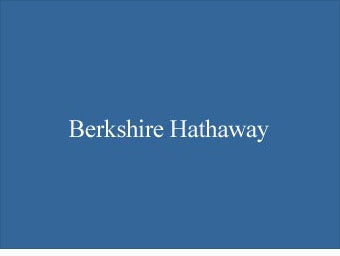
YouTube, CBSNewsOnline.
This is Warren Buffett’s office at Berkshire Hathaway Inc. (NYSE:BRK.B) headquarters in Omaha, Nebraska.
The portrait behind Buffett’s right arm is his father. The file bin at the end of the desk reads “TOO HARD.” There are some magazines, a pile of newspapers, and a phone.
But notice what you don’t see. There are no stock tickers. No Bloomberg terminals. No charting software. No Twitter feeds. No pundits spouting forecasts. No computer monitors, and maybe not even a calculator. Buffett has created more than a quarter-trillion dollars of value for Berkshire Hathaway Inc. (NYSE:BRK.B) shareholders from this desk over the last 50 years. And he did it while rejecting most of the “tools” investors utilize. We can all learn something from that.
We have more information than ever before. Are we better investors because of it? I don’t know of any evidence that we are. In her book Bull!, Maggie Mahar writes: “The problem is that much of the information that investors want — and think they need — is just that, ‘information,’ not knowledge.”
Good investors read a tremendous amount of information, of course. They’re just more selective with what they read and pay attention to.
Here are few ways to become more selective.
Avoid explanations of random events. Pay more attention to historical context.
People can’t stand the idea that events are random and unexplainable, so they try to attach meaning. You’ll see things like, “Stocks fall 0.5% as investors react to manufacturing data” rather than the more honest, “Stocks fall 0.5% because they just do that sometimes.”
Instead of reading explanations of what the market is doing, pay attention to what the market is doing in a historical context. The next time stocks have a down day, remember that they do that, on average, every other day. The next time stocks decline 10% from a recent high, remember that they’ve done that almost every year since the Civil War. And the next time we have a recession, remember that no one in history has made it to the 5th grade without living through at least one recession.
Trying to explain market moves gives us the impression that we can predict the future, which we can’t. Looking at market moves in historical context reminds us to ignore the noise, which we can.
Avoid breaking news. Pay more attention to broad trends.
I found this headline from June 4, 2010: “Stocks Plunge After Weak Jobs Report.”
It’s true: There was a bad jobs report on June 4th, 2010, and stocks did plunge that day. But three years later, who cares? The initial jobs report was revised to show three times as many jobs created than originally thought, and the S&P 500 has since returned 59%. The must-read headlines from June 4, 2010 is now irrelevant and forgotten. The broader trend — jobs slowly coming back, stocks still cheap — was all that mattered for investors.
Breaking news is designed to tug at your emotions and give a sense of urgency, which is exactly when you’re prone to making bad decisions. Broader trends are where the money’s at.






